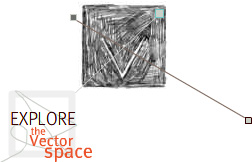Killer Entertainments
Design by Raegan Kelly
Editor's Introduction
Jennifer Terry's Killer Entertainments presents challenges to both designers and users on many levels. How to critically address videos shot by soldiers engaged in combat without sensationalizing, decontextualizing or trivializing them? How to provide access to such a diverse and extensive range of work? How to insert commentary, context and background information while preserving the raw power of the original videos? In response to these challenges, author Jennifer Terry and designer Raegan Kelly developed a rhetoric of connection and accretion which resists linearity and the seductiveness of a single argument illustrated with evidence. Users are led toward no single interpretation; no replacement ideology takes over from that of the Administration's party line. Indeed the text allows for and even encourages responses based in idiosyncracy and uncertainty. The source material presented here all comes from "the Internet," but what does that mean? What can it mean? Which of the sites hosting these materials are "real" and which are run by counter-intelligence agencies hoping to track usage patterns among potential dissidents via IP addresses?
Terry's text also refuses the screen-media convention of text that has been reduced to digestible lexia. The micronarratives, profiles and backstories that make up Terry's analysis, like the unedited videos themselves, insist on a certain investment of time, thought and connection-making. Curiosity and patience are rewarded with a rare feeling that one is not simply the conduit for one of several predetermined responses being called up by mainstream media or academic commentary. In an age when the Google search engine can claim to return over 6 million references to "iraq war" in "(0.11 seconds)," the issue no longer seems to be gaining access to information so much as knowing what to do when we have it at our fingertips. Part of the power of Terry's commentary lies in the flat understatement of her text. When she drops raw figures -- such as the fact that coalition forces have fired more than 250,000 bullets for every "insurgent" killed in Iraq -- the number seems to hang impossibly on the page. The point is not to dramatize, shock or dismay, but to suggest the importance of educating ourselves out of our narrowness of concern. The Iraq war is happening now -- with men and women killing and dying in our names whether we like it or not. We owe it to them, at the very least, to watch, read, listen, think, and then decide for ourselves exactly how we intend to act.



